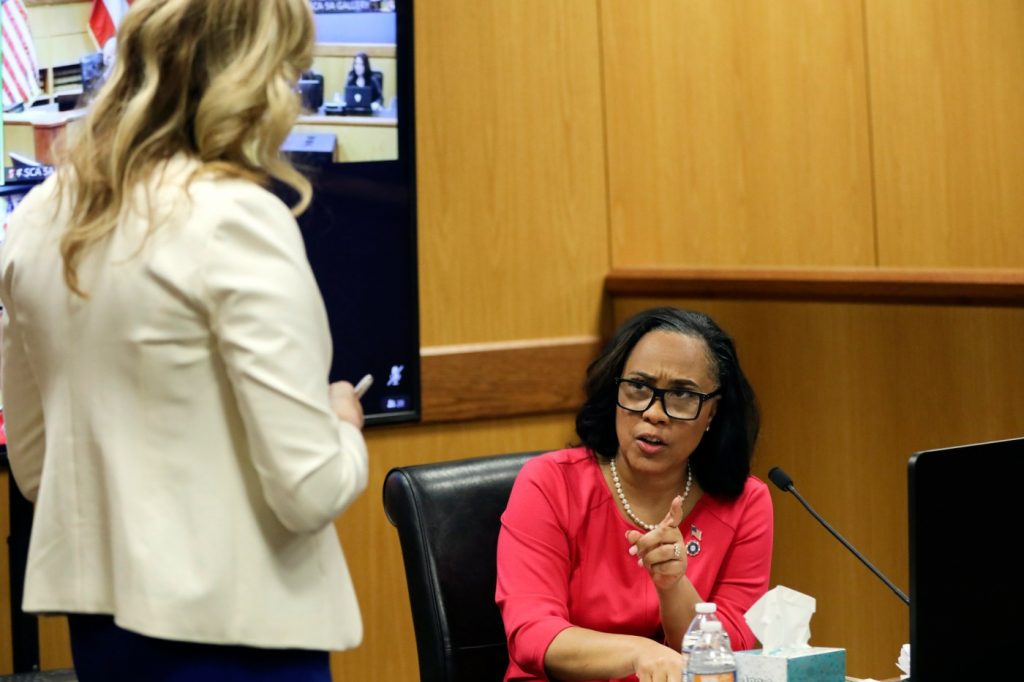At this point, it doesn’t really matter whether Fulton County District Attorney Fani Willis benefited financially from her relationship with Nathan Wade, the outside prosecutor she hired to help oversee the election interference racketeering case against former President Donald Trump and 18 others, several of whom have already pleaded guilty.
After watching her testify for nearly two hours recently, I think she made a convincing case that she did not. If anything, she spent more money on him than he did on her.
But by engaging in a romantic relationship with Wade (and believing she was under no obligation to disclose it), she handed her opponents — on a golden platter — an opening to challenge her integrity, an excuse to charge her with a conflict of interest, a backdoor way to stymie the strong criminal case against Trump and his supporters that took her office many months years to construct.
It’s mind-boggling. And so, so disappointing. Two mature adults — officers of the court, experienced attorneys — could not find it in themselves to put their romantic inclinations on hold while working on the most important case of their careers, and one of the most important criminal cases in American history? They should have known that any whiff of impropriety would be exploited to tank the case. You cannot be traipsing off together to places like Belize and Aruba and expect to keep it a secret. Good lord.
It’s impossible to predict whether Fulton County Superior Court Judge Scott McAfee will rule that Willis should be disqualified from the case, which would throw it into disarray and potentially kill it, but he absolutely did the right thing by allowing both sides to air the issue, on television, in real time.
The drama in his courtroom proved as riveting as any daytime soap opera.
Willis’ attorneys were in the midst of arguing there was no compelling need for her to testify when she surprised everyone by striding into the courtroom looking for her close-up. She wore a hot pink dress and, it would soon become clear, she had a temper to match.
“I have been very anxious to have this conversation today,” she said. “I ran to the courtroom. … I am not a hostile witness. I very much want to be here.”
A new kind of hostile
Her testimony was captivating, if maddening. Oh, and she was plenty hostile, though not in the legal sense. When she wasn’t being combative, she was folksy, personal and even philosophical. We learned she prefers Grey Goose vodka to wine, spent “big” on Wade’s 50th birthday trip to Belize and once visited Tennessee with him, although “Tennessee is kinda hard to call a vacation.” Willis refused to give yes-or-no answers to simple questions, drawing at least two admonitions from the judge. She insisted that her answers needed to be long and in context because she was batting down so many lies.
She accused defense attorney Ashleigh Merchant, who is representing one of the defendants in the election interference case and first raised the conflict-of-interest question, of lying repeatedly about when she started her relationship with Wade, of wrongly accusing the pair of living together and of being treated to free trips.
Merchant has alleged that Willis hired Wade to help prosecute Trump because the prosecutors were romantically involved, and she has accused Willis of benefiting financially because Wade paid for various vacations while they were lovers.
But both Wade and Willis testified that their romance began in early 2022, well after he was hired, and ended in the summer of 2023, just around the time that Trump was indicted in Georgia.
In order to be more exact about when they called it quits, Willis offered a lesson in gender differences worthy of the relationship classic “Men are From Mars, Women are From Venus.”
“He’s a man; he probably would say June or July,” she said. “I would say we had a tough conversation in August. Men end relationships at the end of physical intimacy; women end relationships when that tough conversation takes place.”
What, exactly, was that tough conversation about? No one asked, but Willis had every reason to explain it. They ended their relationship, she said, because she was too independent for him.
“We would have brutal arguments about the fact that I am your equal,” she said. “I don’t need anything from a man; a man is not a plan, a man is a companion. There was tension always in our relationship, which is why I would give him his money back. I don’t need anybody to foot my bills.”
Does that sound like someone looking for a free trip to Aruba?
One time, she testified, Wade told her, “The only thing a woman can do for him is make him a sandwich.” Ugh.
‘Hordes of cash’
Willis has no receipts to prove she repaid Wade, she said, because she always keeps plenty of cash on hand, sometimes as much as $15,000. Her father taught her that, she said. For instance, if you go on a date, you bring $200 in cash in case things go sideways.
Friday in court, her father, John Floyd III, backed her up. “Your honor,” he said, “I’m not trying to be racist, OK? But it’s a Black thing, OK? I was trained, and most Black folks, they hide cash or they keep cash.”
One exchange between Willis and Trump attorney Steve Sadow sticks with me. It illuminated a kind of race or class gap. Sadow seemed steeped in privilege as he poked at the idea that she might keep plenty of cash on hand.
Related Articles
6 takeaways from the scathing appeals court ruling denying immunity to Donald Trump
Read: Donald Trump presidential immunity ruling
Donald Trump is not immune from prosecution in his 2020 election interference case, US appeals court says
Floyd testified he taught his daughter to always keep enough cash at home to cover six months of expenses. And so, Willis said, she took $4,000 with her on Wade’s birthday trip to Belize in March 2023. Of that, she reimbursed him $2,500 for their hotel, flights and food.
“That $4,000 is part of your — my words — cash hoard that you have collected over time?” asked Sadow.
“Cash what?” Willis said.
“Hoard,” he said, but then he spelled it “h-o-r-d-e.”
“Oh, I thought you said something different, sir.”
Her well-deserved umbrage at that point cannot hide the fact that she screwed up here, or that the entire country may end up paying for her unforgivable mistake.
Robin Abcarian is a columnist for the Los Angeles Times. ©2024 Los Angeles Times. Distributed by Tribune Content Agency.


